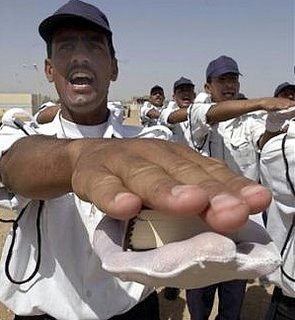Iraq stumbling in bid to purge rogue police
 Iraqi police recruits hold copies of the Quran as they are sworn in during a graduation ceremony in Najaf, 160 kilometers (100 miles) south of Baghdad, Thursday, May 11, 2006. As part of a new security campaign, officials plan to restructure police forces in the capital under the newly formed National Police force. Currently, Baghdad is filled with tens of thousands of police officers, soldiers and paramilitary troops whose identities and allegiances often are not known.
Iraqi police recruits hold copies of the Quran as they are sworn in during a graduation ceremony in Najaf, 160 kilometers (100 miles) south of Baghdad, Thursday, May 11, 2006. As part of a new security campaign, officials plan to restructure police forces in the capital under the newly formed National Police force. Currently, Baghdad is filled with tens of thousands of police officers, soldiers and paramilitary troops whose identities and allegiances often are not known.BAGHDAD, Sept. 16 — Shiite militiamen and criminals entrenched throughout Iraq’s police and internal security forces are blocking recent efforts by some Iraqi leaders and the American military to root them out, a step critical to winning the trust of skeptical Sunni Arabs and quelling the sectarian conflict, Iraqi and Western officials say.
The new interior minister, Jawad al-Bolani, who oversees the police, lacks the political support to purge many of the worst offenders, including senior managers who tolerated or encouraged the infiltration of Shiite militias into the police under the previous government, according to interviews with more than a dozen officials who work with the ministry and the police.
No one expected a housecleaning to be easy, and some headway has been made in firing people. But despite that progress, recent difficulties reveal the magnitude of the task facing Mr. Bolani and Prime Minister Nuri Kamal al-Maliki. When he took office in late May, Mr. Maliki said one of his top goals was to reform the Shiite-led Interior Ministry, which had, to the minority Sunni Arabs, become synonymous with government complicity in abduction, torture and killing.
The ministry recently discovered that more than 1,200 policemen and other employees had been convicted years ago of murder, rape and other violent crimes, said a Western diplomat who has close contact with the ministry. Some were even on death row. Few have been fired.
Despite the importance American commanders place on hiring more Sunni Arabs for the overwhelmingly Shiite police force, the ministry still has no way to screen recruits by sect or for militia allegiance. Such loyalties are the root cause of the ministry’s problems.
A senior American commander said that of the 27 paramilitary police battalions, “we think 5 or 6 battalions probably have leaders that have led that part of the organization in a way that is either criminal or sectarian or both.”
Death squads in uniforms could be responsible for the recent surge in sectarian violence, with at least 165 bodies found across Baghdad since Wednesday.
There is little accountability. The government has stopped allowing joint Iraqi and American teams to inspect Iraqi prisons. No senior ministry officials have been prosecuted on charges of detainee mistreatment, in spite of fresh discoveries of abuse and torture, including a little-reported case involving children packed into a prison of more than 1,400 inmates. Internal investigations into secret prisons, corruption and other potential criminal activity are often blocked.
Read the rest at the NY Times

<< Home